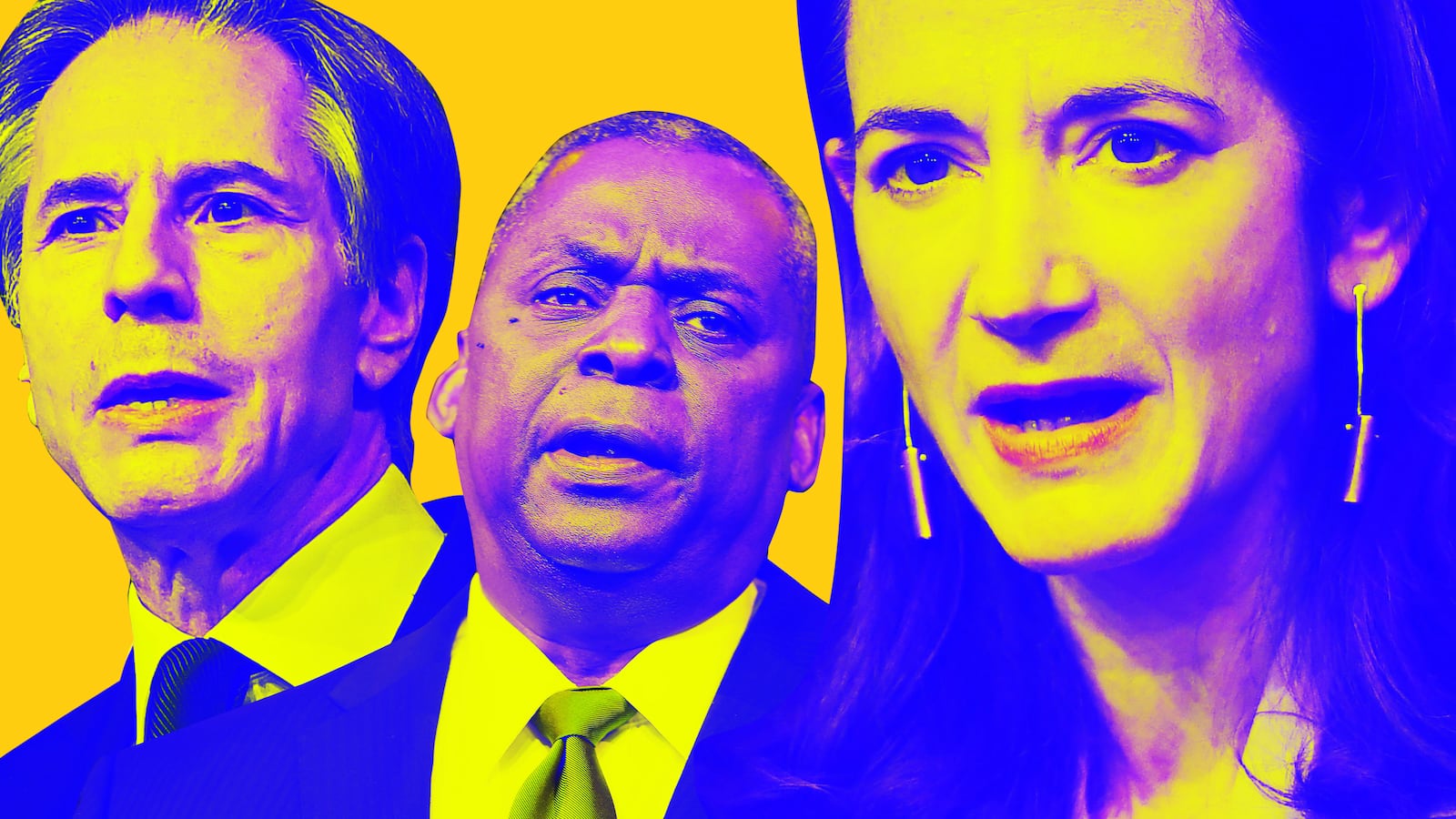In January of 1961, President Eisenhower warned the nation of the union between the mushrooming arms industry and the Department of Defense. The military-industrial complex, as he put it, would imperil democracy and put the defense industry in the driver’s seat of the nation’s foreign and domestic policy. And now, Joe Biden, with his early foreign policy and defense picks, has made some choices that are emblematic of a conflict of interest-laden status quo for which there is no constituency (at least not one that isn’t on the payroll).
WestExec Advisors—a defense industry consulting firm poised to revolve several of its leaders into prominent cabinet positions in the Biden administration—is a dangerous manifestation of Eisenhower’s warning. Obama alums Michèle Flournoy and Antony Blinken founded the firm in 2017 and advertise their business as the road “from the Situation Room to the board room.” They bolstered their claims to insider access with other Obama administration hires like White House Communications Director Jen Psaki and Deputy National Security Adviser Avril Haines.
With these well-connected figures on staff, it’s plain what the firm means when it promises to bring “the full power of our network to bear in helping clients navigate rapidly emerging challenges and opportunities.”
WestExec and firms like it exist to commoditize insider expertise derived from public service and auction it to the highest bidder. The firm’s principals avoid officially registering as lobbyists, thus masking much of the firm’s activity. They also deploy non-disclosure agreements to obscure their clientele. While the full extent of WestExec’s clients are thus unknown, it has been reported that the firm has helped clients like Shield AI (a company that makes surveillance drones) win contracts with the federal government.
And now the firms’ members are set to storm the gates of the incoming Biden administration. Blinken will serve as secretary of state. Haines, a WestExec consultant who previously helped run President Obama’s drone program, is Biden’s pick for director of national intelligence. Gen. Lloyd Austin, the nominee for secretary of defense, is on the board of the firm’s investment fund, Pine Island Capital Partners.
In case there’s any question about what its clients are paying for, Pine Island’s venture capital arm has raised $218 million since the announcement of Blinken and Austin’s nominations. Pine Island’s financial disclosure expressed confidence in making inroads into the “aerospace, defense and government services industries.” Five WestExec employees, all Obama alums, also staff Biden’s review teams in the Pentagon and Treasury departments.
Chances are, if you’re not one of the finite number getting rich and powerful off of this scheme, you find it pretty disturbing. In a moment when Americans are divided on so much, the shared desire for political leadership that works for them, not the highest bidder, is a rare unifying force.
When political leaders move seamlessly from setting policy to influencing policy on behalf of the corporate bottom line and then back again, it’s only natural to doubt that they can erect an impenetrable firewall between the two sets of frequently divergent interests. For example, let’s say an appointee opposes ending the arms sales to Saudi Arabia and the United Arab Emirates that are helping to facilitate the disastrous war in Yemen. How are citizens to know that that position stems from personal conviction and not a defense contractor’s check?
Perhaps that is why one particularly skilled politician, then-Senator Barack Obama, put ethics in government at the center of his campaign for the presidency. After eight years of corruption and scandal under George W. Bush, Obama promised a new commitment to government without corporate capture.
Lofty promises were quickly turned into concrete policy, if imperfectly. On his first day in office, Obama signed an executive order that banned registered lobbyists from taking a job in any agency they had lobbied within the past two years. It also prohibited outgoing officials from lobbying “covered” officials for the duration of the administration.
The standards were historic and yet, at the end of eight years in office, no one was under the impression that they had completely fixed the problem. Some of that has to do with the administration’s relatively frequent use of waivers to circumvent its own rules. (Of course, in just three years, the Trump administration managed to grant six times as many waivers as Obama did in six years, so all things in perspective). Arguably more important, however, are the types of people the executive order never included to begin with.
Registered lobbyists make up just a modest portion of Washington’s influence industry and perform a fraction of the activities that any reasonable person would consider “lobbying.” If you’re a former politician who orchestrates an influence campaign, directing a team of registered lobbyists about whom to contact and how, you need not register.
Similarly, if you offer a corporate legal team an in-depth guide to the government’s weaknesses, idiosyncrasies, and strengths, no member of the public pouring over lobbying disclosures need be any the wiser. By building the executive order around the deeply flawed legal category of “lobbying,” Obama left all manner of unsavory “shadow lobbying” untouched (while shutting out several lobbyists who had been fighting for things like stronger environmental regulations, expanded rights to collective bargaining, and immigration reform to boot). The road for Blinken, Haines, and others to sell their expertise was entirely clear.
The lesson to take from this is not that ethics reform as policy and political strategy is futile. It’s that new measures need to be smarter, or rather more commonsensical, about the way power is actually wielded in Washington. That starts with acknowledging the full suite of activities that are helping corporations get a leg up in the federal government and zeroing in on the clients for which that work is being performed.
Ideally, all of those who have been working to further tilt the political balance in corporate America’s favor will be shut out. But even more is needed to really stop the revolving door from spinning. People cannot be confident that an official is really representing the public interest to the best of their ability if they’re likely to head right back into the arms of their adversaries when their time in government has come to an end. Strong restrictions on appointees’ ability to revolve out and “shadow” lobby are essential.
It’s clear that Biden is not yet convinced of the case for such restrictions on the merits. But a sober assessment of what’s at stake politically could do the trick. Confirmation fights haven’t even begun yet and already right-wing media is working itself into a frenzy over WestExec Advisors and similar operations. There’s no indication whatsoever that fear of being (correctly) labeled hypocrites will deter them.
There’s even less evidence to support the idea that Americans will cease to care about corporate influence in government just because Trump’s administration plumbed new depths of executive branch corruption (one difference: unlike congressional Democrats, congressional Republicans are skilled at garnering media focus on their investigations). By failing to act, or even by replicating the Obama-era standards, Biden will cede a potent political argument to opponents who are ready to weaponize it in bad faith.
In contrast, by instituting historic ethics commitments, the Biden administration can go on offense and lay claim to the cause of anti-corruption. In particular, strong restrictions on revolving out of government will allow Biden to endlessly highlight his administration’s ethical bona fides over the coming months as former Trump officials revolve from regulator to the arms of the regulated (that process is already beginning).
It will be hard to rebuild trust in government so long as the Alex Azars, Tony Blinkens, and Avril Haineses are allowed to trade on their inside knowledge for big payouts, then turn right back into government to start again. And it won’t be possible to shut these figures out if we rely on antiquated categories to map political influence. If Biden is serious about uniting the populace behind and not against him, there is no more natural place to start than by making clear that his administration will work for the public interest, not corporate America’s.







